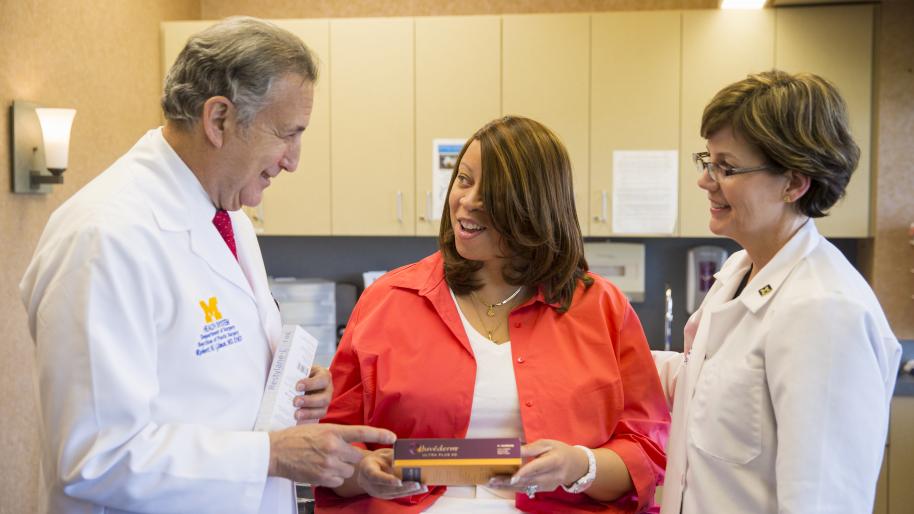What are Injectable Fillers?
Injectable fillers are soft tissues, most commonly Restylane®, fat or collagen, that can improve skin texture and reduce fine lines around the eyes and mouth. Injecting filler beneath skin raises the skin, resulting in more youthful facial contours and a rejuvenated appearance.
Who is a good candidate for Injectable Fillers?
Candidates must be in good health, have no active diseases or serious, pre-existing medical conditions, and must have realistic expectations of the outcome of the surgery. In most cases injectable fillers are used to treat scarring, sagging skin or facial wrinkling, loss of fat, plumpness or for individuals with high contours of the soft tissues of the face. Your surgeon will recommend the best form of injectable filler depending on the treatment you are seeking.
NOTE: You may not be a candidate for surgery if you smoke, have recently quit smoking, or if you are exposed to second-hand smoke. Primary and secondary smoking decreases blood flow to the body's tissues. This can result in prolonged wound healing and a number of other complications depending on the kind of procedure performed. Click here for more information related to smoking.
How is the procedure performed?
Restylane®
Restylane® is a natural gel substance containing hyaluronic acid. Treatment involves the injection of the gel into the skin in tiny amounts with a very fine needle. This can be effective for smoothing wrinkles, sculpting lips and improving facial contours. Results may last as long as six months. According to the American Society of Plastic Surgeons, more than 44,000 people had Restylane injections in 2003.
Fat
Fat injection treatment removes fat from one part of the patient's body (usually the abdomen, thighs or buttocks) and reinjects it beneath facial skin. Allergic reaction is not a factor since the fat is from the patient's own body. The procedure has been used for years to add volume, fill wrinkles, lines and enhance the lips. Results can be permanent, but this may vary. According to the American Society of Plastic Surgeons, more than 61,000 individuals had fat injections in 2003.
Collagen
Collagen is a natural skin protein that can be manufactured for injection. It can be used to fill wrinkles, lines and scars. Treatment can be done on the face and sometimes the neck, back and chest. Results may last as long as six months
List of Physicians Who Provide Injectable Fillers
For details about education, experience, and specialty in this clinical area, please visit these physician profile pages:
- David L. Brown, M.D.
- Paul S. Cederna, M.D.
- Robert H. Gilman, M.D., D.M.D.
- Steven Kasten, M.D., M.H.P.E.
- Tonyia Seeland, P.A.
Planning for Your Procedure
First, schedule a personal consultation with your plastic surgeon. Communication is vital in reaching your goals. You will have the opportunity to discuss your goals and the results you'd like to achieve. Your surgeon will work with you to reach an understanding about what you can expect from this procedure and what long-term benefits you will experience. Every patient is different, and your surgeon will choose the surgical technique and treatment plan that is right for you. During your initial consultation:
- Provide a complete medical history. Include information about any previous surgical procedures; past and present medical conditions; and all medications or herbal supplements you are taking.
- Expect your surgeon to examine to conduct a complete physical examination.
- Be prepared to discuss possible risks and complications of the procedure.
Preparing for Your Procedure
You will be given specific instructions on how to prepare for your procedure. An information packet will be provided that explains everything you should do and know before your procedure date. Your surgeon will give you specific instructions on how to prepare for your procedure, and what you can expect during the recovery period. This will include guidelines on eating and drinking, smoking, and which vitamins and medications should be taken or avoided.
Where Your Procedure Will be Performed
Your procedure will take place at the University of Michigan Hospitals' Domino's Clinic on an out-patient basis. Directions to the Domino's Clinic.
Types of Anesthesia
You'll remain comfortable throughout the entire procedure. In most cases, no anesthetic or only a topical anesthetic is needed. Sedation can be used as well. If you elect to use sedation, be sure to arrange for a ride home after the procedure.

